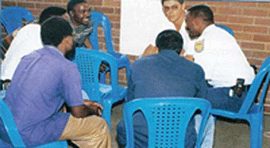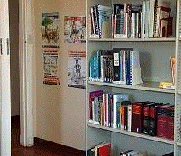“Before the support centres, a woman who had been raped would have to stand in line at the charge office, then give details to a policeman across the counter, in front of everyone in the room.”
- CCJ Director Winnie Kubayi
Foundation and Early Work, 1990 - 1994

The Centre for Criminal Justice (CCJ) was founded in 1989 by staff of the School of Law of the University of Natal, Pietermaritzburg. It was established as a research centre aimed at promoting and protecting human rights in the criminal justice system, and was formed as a response to the failure of the system to deal effectively with the political violence in the greater Pietermaritzburg area. About three thousand deaths occurred in the region during the last years of apartheid, for which a small number of perpetrators were prosecuted and even fewer convicted. The failure of the justice system to cope with political-related crime became a concern for many lawyers, such as Professor Anthony Mathews (right), the Dean of Law of the University of Natal, and professor JTR Milton, who proposed setting up CCJ. As Mathews said, “This research will not be ivory tower stuff but will seek to lay bare the underlying causes of the system’s failure and to provide the ground work for reform proposals. Violence remains at a frightening level around us”.
Read a short biography of Professor Mathews
Research into Policing
Under its first director Professor Mathews, the Centre used researchers to study the nature of the political conflict in the early 90s and the breakdown of the criminal justice system. The aim was to identify the system’s weaknesses and the reforms necessary to restore it to effectiveness and to adapt it to the changing political order. The Centre focused on policing because there was obvious and widespread dissatisfaction with it and because failures in police services affect the entire legal system.
Research into the policing of the conflict showed that much of it was partisan, and that police conduct differed markedly depending on whether a favoured or disfavoured group was involved. Issues of racism, assault and torture by police were also documented. From 1990 to 1993 research papers produced by the CCJ were presented at conferences and published in local and international academic journals.
Contributing to Transformation 
The research focus led to two high-profile conferences on policing in 1991 and 1992, as well as conferences in 1993 on the prosecution services and women under the criminal justice system. CCJ’s vision was that these conferences should be a spring-board to change and reform. The Centre tried to seek solutions based on educating the parties involved and on their future co-existence, rather than try to indict those responsible for crimes.
The success of these conferences, which owed much to the work, reputation and international stature of Professor Mathews, led to the establishment of influential working groups and to one of the first high-level meetings of major political parties on the issue of policing. These discussions in turn undoubtedly contributed to change in the relevant areas of the criminal justice system.
Community Projects 1994 - 1996
The changing political order from apartheid to democracy, with the accompanying equitable legislation, saw the Centre shift its focus away from research to expanding people’s access to their new rights. Research had shown that inhabitants of rural areas, especially women, experienced difficulty in dealing with the criminal justice system and accessing their rights. Women felt that they were not treated fairly or with due sensitivity when reporting crimes. It was clear that gender discrimination could not be eliminated by legislation only.
In response to this, from 1994 the Centre conducted workshops with police, prosecutors, social workers and traditional leaders in rural communities, training them to deal more sensitively with rape and sexual abuse cases. It conducted further research into why women found it difficult to deal with the criminal justice system, and in 1996 was invited by Plessislaer Police Station near Pietermaritzburg to conduct training workshops for police officers. The result was a more sensitive approach in dealing with rape, sexual abuse and domestic violence at the station. CCJ also carried out skills training for young people in prison and conducted workshops on children’s and prisoners’ rights.
Community Outreach Program: 1997 – the Present
These initiatives led in 1997 to the Community Outreach Programme, by which support centres were established at institutions of criminal justice around the province. These aimed to work with police and magistrates to help women and children in rural areas who were victims of rape, sexual assault and other forms of abuse. The program aimed to equip women and children with the knowledge and skills to learn about and claim the rights guaranteed by the new democratic constitution: otherwise, these rights would only be on paper. Since the aim was in part to encourage women and children to come forward to report crimes, the staff of the outreach program were all female.
Broadening the Target Group
It soon became clear that clients, including an increasing number of men, also wanted help with issues such as labour disputes and obtaining pensions, social grants and child maintenance. Therefore the support centres widened their scope and now use the law and state services to try to solve almost any legal, social or personal problem that individuals have. While they often have to refer a problem to another organisation, they always give it their attention.

Expanding the Research Program
In 2009, CCJ started to revive the emphasis on research that characterised it during the early 1990s, aiming to attract and fund researchers and to fulfil its duty as part of the university to generate knowledge that is shared by others.
While contributing to the publication of works and the sharing of knowledge, research is also used to improve and refine the service of coordinators. Research could have a wider impact too, as the findings may provide a foundation for advocating improvement on a national level in the justice system, the provision of social services and other aspects of service delivery.
Find out more about our research program